

Teaching for Distinction, the Oldham College #CPDinFE programme is working! This week, the news was released that Oldham College received a strongly positive inspection outcome: The press report here, tells the story: After an intensive four-day inspection with a large team, the College was judged ‘Good’ in all categories – many more than apply to a school.
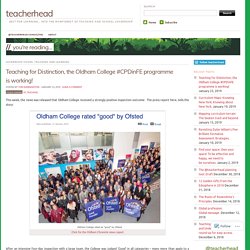
This is such great news. As anyone who has been there knows, operating under an RI judgement is really tough and whilst we might all wish the grades didn’t exist, they do – and it’s brilliant to be able to break free from a label that holds you back so everyone can finally embrace the future on the front foot with all the efforts of staff and students, validated, recognised and celebrated. A strong feature of the report is that the college is recognised absolutely rightly for being strongly inclusive with exemplary behaviour.
In my experience, the college has the most inclusive student culture of anywhere I’ve ever been. Teaching for Distinction @OldhamCollege. FE CPD in action. The principles of Teaching for Distinction apply to all college faculty areas.
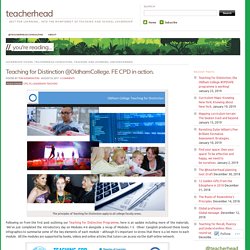
Following on from the first post outlining our Teaching for Distinction Programme, here is an update including more of the materials. We’ve just completed the introductory day on Modules 4-6 alongside a recap of Modules 1-3. Oliver Caviglioli produced these lovely infographics to summarise some of the key elements of each module – although it’s important to stress that there is a lot more to each module. All the modules are supported by books, videos and online articles that tutors can access via the staff online network. Modules 1 – 3. Teaching for Distinction @OldhamCollege. The most exciting job I’ve had since starting out with Teacherhead Consulting has been working with Oldham College.
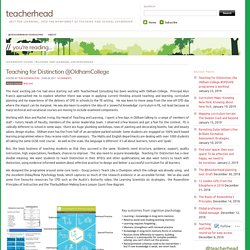
Principal Alun Francis approached me to explore whether there was scope in applying current thinking around teaching and learning, curriculum planning and my experience of the delivery of CPD in schools to the FE setting. He was keen to move away from the one-off CPD day where the impact can be marginal. He was also keen to explore the idea of a ‘powerful knowledge’ curriculum in FE, not least because so many technical and vocational courses are moving to include examined components. Working with Alun and Rachel Irving, the Head of Teaching and Learning, I spent a few days in Oldham talking to a range of members of staff – tutors, Heads of Faculty, members of the senior leadership team. AP Guide: Facilitating Professional Development and High-Performance Teams Through Situated Learning. AP Guide: Creating Spaces to Think in Further Education and Training. Unleashing Great Teaching Webinar Event.
Learning Festival 2016. Learning Festival 2017. DigiLearn: Building community, sharing practice and recognising achievement – UK Microsoft Educator Blog. Today's guest blog post comes from one of our MIE Experts Chris Melia, a Learning Technologist at the University of Central Lancashire.
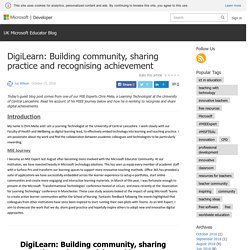
Read his account of his MIEE journey below and how he is working to recognise and share digital achievements. Introduction My name is Chris Melia and I am a Learning Technologist at the University of Central Lancashire. I work closely with our Faculty of Health and Wellbeing as digital learning lead, to effectively embed technology into learning and teaching practice. I am passionate about my work and find the collaboration between academic colleagues and technologists to be particularly rewarding. MIE Journey I became an MIE Expert last August after becoming more involved with the Microsoft Educator Community. How do we recognise and share the digital achievements of our academic colleagues? At the University of Central Lancashire, ‘DigiLearn’ is rapidly becoming the solution. It all starts with a community of practice… FAB – Opening the Arms. By Lou Mycroft (PDNorth Digital Lead) Some years ago, I was part of a team running digital CPD for educators.
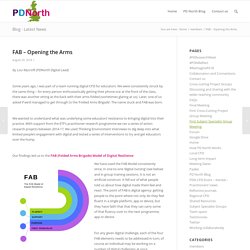
We were consistently struck by the same thing – for every person enthusiastically getting their phone out at the front of the class, there was another sitting at the back with their arms folded (sometimes glaring at us). Later, one of us asked if we’d managed to get through to the ‘Folded Arms Brigade’. The name stuck and FAB was born. We wanted to understand what was underlying some educators’ resistance to bringing digital into their practice. What makes for good CPD? In the 21 September issue of Tes, Harry Fletcher-Wood and Sam Sims question the evidence behind the government CPD guidelines.
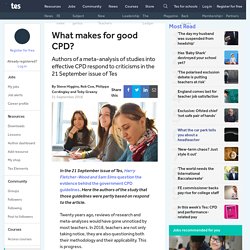
Here the authors of the study that those guidelines were partly based on respond to the article. Twenty years ago, reviews of research and meta-analyses would have gone unnoticed by most teachers. In 2018, teachers are not only taking notice, they are also questioning both their methodology and their applicability. Planning your Learning Path. MS Bootcamp Level Up with Grimsby. CPD Packs. Teacher research makes us masters of our profession - The Education and Training Foundation.
Posted on August 21st, 2018 In the 10 August edition of the Times Educational Supplement, David Russell, the Chief Executive of the Education and Training Foundation, makes a strong case for the importance of practitioner research in improving learner outcomes and creating a masterful teaching profession.
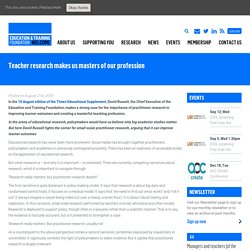
In the arena of educational research, policymakers would have us believe only big academic studies matter. ETF Shaping Success in the North: Maths and English Support. How to Plan Outstanding Tech Training for Your Teachers. College Net. Behaviour Buddy – Behaviour management doesn't have to be tough.
Situated Learning Theory (Lave) - Learning Theories. Summary: Situated Learning Theory posits that learning is unintentional and situated within authentic activity, context, and culture.
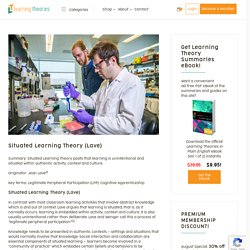
Originator: Jean Lave[1] Key Terms: Legitimate Peripheral Participation (LPP), Cognitive Apprenticeship. Speed-Dating: The Life Of A Deputy Headteacher.
An Experiment within an Experiment, Informed by Evidence within Evidence #CPDinFE. The feeling I experience at this moment in time will be familiar to many an educator.
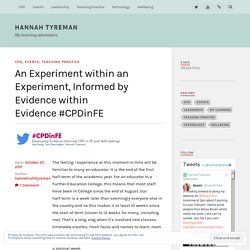
It is the end of the first half-term of the academic year. For an educator in a Further Education College, this means that most staff have been in College since the end of August. Our half-term is a week later than seemingly everyone else in the country and so this makes it at least 10 weeks since the start of term (closer to 12 weeks for many, including me). That’s a long slog when it’s involved new classes, timetable clashes, fresh faces and names to learn, room changes, new syllabi, as well as the usual high levels of decision making, pace of activity and load of teaching in a normal week. It would seem that I have enough left in my batteries to eek out a short (actually not so short now I’ve written it!) The day’s activities began with me asking participants to answer the question, March 2017 - Effective CPD and its implications for students and lecturers in college HE, Sam Jones.
What is Effective CPD? Research on CPD demonstrates that many teachers and trainers do not participate in professional development activities and the most common reasons given are conflicts in work schedules and an absence of incentives for participation.

Add to this a marked decline in investment by schools supported by figures compiled by the Teacher Development Trust earlier this year found that across the whole education sector, schools spend an average of just 0.7 per cent of their income on developing their teaching workforce. This unfortunately all contributes to the promotion of an increasing trend towards “do-it-yourself” CPD where the most ambitious and self-motivated teachers and educators benefit the most, as will those who are able to spend weekends and their own money on their professional development. Which leads us to ask so what is truly effective CPD? 5 Easy Steps towards better CPD: Developing Great Teaching by @TeacherToolkit. #1MinCPD. Using Twitter for Professional Learning – robin_macp.
This post is aimed at teachers who are new to Twitter, but may also be useful to those mentoring a new teacher and want to help them shape their professional learning. It’s based on a talk given to colleagues at a recent inset day as part of an ed tech carousel. Twitter for Professional Learning In 2014, Twitter estimated that 4.2 million tweets on education were sent every day. If you haven’t used it before because you think it’s simply a passing fad, then you’d be mistaken. I joined Twitter in 2012 after hearing Jill Berry extol its virtues as a vehicle for professional learning.